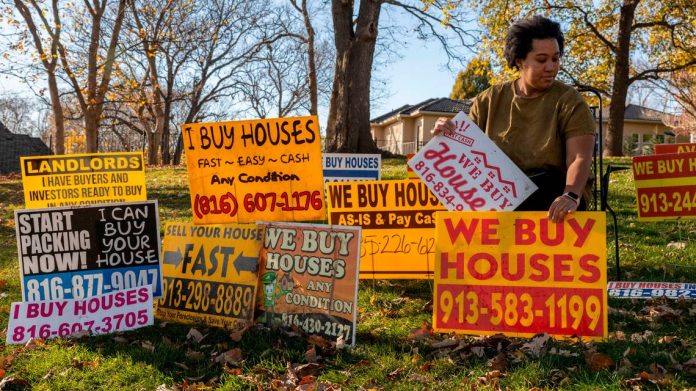You’ve likely recognized the signs around your area: “We purchase houses,” “Money for homes,” or “Sell us your home as/is!” You might have even moaned at how inescapable they’ve become.
Provided that this is true, you’re in good company. These signs, which come from land venture bunches that gather up houses the nation over — frequently paying 10% or more underneath the market esteem — are turning out to be increasingly more typical in the present hot housing market.
The objective? Flip each house into a more costly property, or transform it into a rental unit.
Land financial backers are offering cash for homes in pretty much any area in any piece of the U.S. nowadays, regardless of the state of the property, says Nick Bailey, boss client official at RE/MAX. In January 2021, middle existing home costs leaped to $303,900 — 14.1% higher than last year, as per the National Association of Realtors (NAR). Financial backers, who endeavor to buy homes underneath the market worth and sell at the greatest expense conceivable, “are standing out enough to be noticed … since it’s more straightforward to purchase and flip when costs are going up,” Bailey says.
With home costs rising, property holders may be enticed to sell their homes rapidly, particularly assuming that they’ve lost their positions or are under monetary strain from COVID-19. What’s more, since most property holders don’t understand how much their homes are worth, or that a couple of fixes could up its incentive for a somewhat minimal expense, a data hole is stoking the fire, as per Eric Sussman, an assistant land teacher at the University of California Los Angeles (UCLA).
Is offering your home to a venture bunch generally an ill-conceived notion? Not really, land specialists say. However, you want to tread carefully.
They base their proposals on a few variables, including the market worth of a completely reestablished home in the area, the region’s similar deals, the expense of fixing the home (remembering a cushion for case redesigns is more than anticipated), and the costs of holding the house until it’s exchanged.
In the event that a property holder acknowledges the deal, they utilize the cash to take care of their home loan (assuming they have one), and the rest comes to them in real money.
Selling a home with a customary realtor isn’t really straightforward: Added costs incorporate a normal commission of around 6%, and are contingent upon the state, shutting costs that can run from 2% to 5% of the price tag. Merchants need to pay for fixes, as well, and keeping in mind that the house is available, they’re stuck paying the home loan and different costs.
Is selling a permanent spot for cash a fair plan?
In 2020, 89% of home dealers worked with a realtor to sell their property, as per NAR. For most mortgage holders, this course is the most ideal way to get as much as possible for their home — particularly in the present housing market.
Basically, there are fewer homes available at this moment, so the contest is high and numerous merchants are rounding up offers. By and large, making do with a lower cost from a financial backer simply doesn’t seem OK.
“Assuming someone has a house that is in extraordinary condition and was underlying the most recent 10 years, a land financial backer is positively not going to be ideal for them,” Brandt says. “They will get the most incentive for their cash by selling through a realtor.”
Imagine a scenario in which you really want to rapidly sell.
Practicality and comfort are the primary benefits of offering to a land financial backer. Standard closings can require 30 to 45 days, all things considered. With a financial backer, it could require seven days.
Mortgage holders who select to offer to financial backers are normally in abandonment or have homes that need fixes they can’t manage. Another normal situation is somebody who acquires a home in a state they don’t reside in.
“At the point when time is a higher priority than your value,” going through a financial backer might be the ideal decision, RE/MAX’s Bailey says.
In any case, he adds, there are typically better other options.
A few modest fixes, similar to a new coat or an updated lawn, can add thousands in extra value. Regardless of whether that is impossible, loads of purchasers are gathering up homes that aren’t in excellent condition in the present market.
The most effective method to detect a trick
Not at all like realtors, financial backers don’t need to be authorized, so nearly anybody can enter the space and begin making offers on homes.
There are a lot of straight-up troublemakers, as well. Lawyers general in states like New Jersey and Pennsylvania have given cautions about tricksters who back out of vows to take care of a dealer’s home loan after the deed is agreed upon. Other evil financial planning bunches take steps to pull out of a deal last-minute except if a mortgage holder makes shock fixes.
Property holders need to get their work done in the event that they intend to offer to a financial backer, UCLA’s Sussman says. Ensure they’re addressed by a genuine organization: Check out their site, follow the telephone number that is recorded on the sign, and converse with neighborhood realtors to get their take.
“Data and instruction are power, all things considered,” he says. “These purchasers are clearly in the lucrative business. However long you’re OK with that and mindful of their technique, indeed, sell.”


































